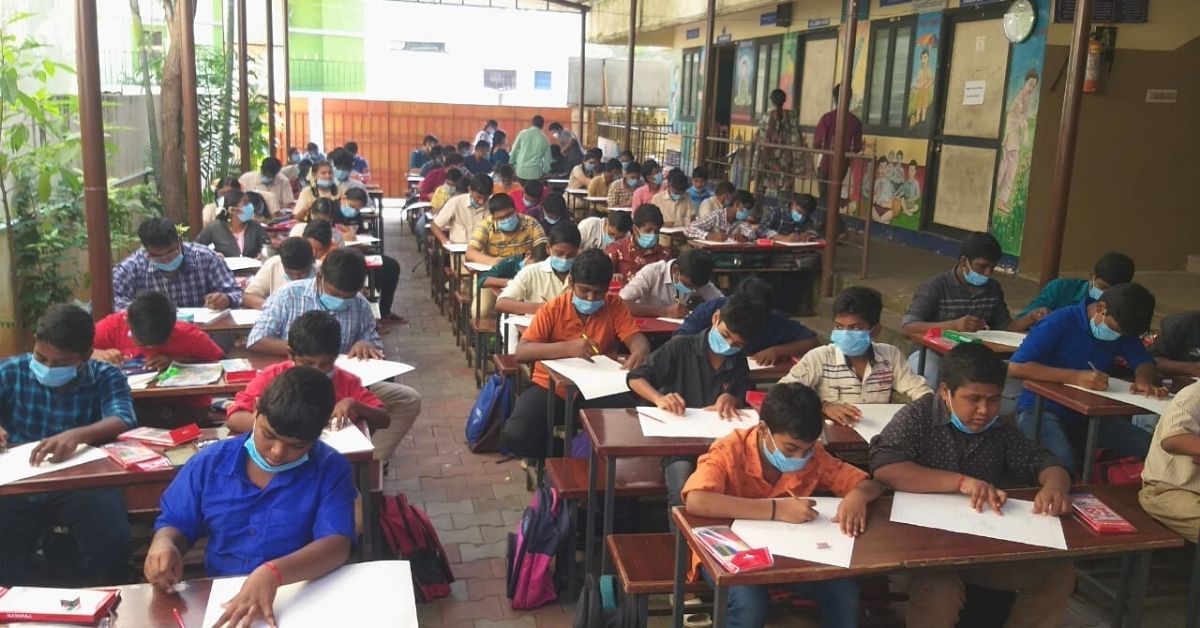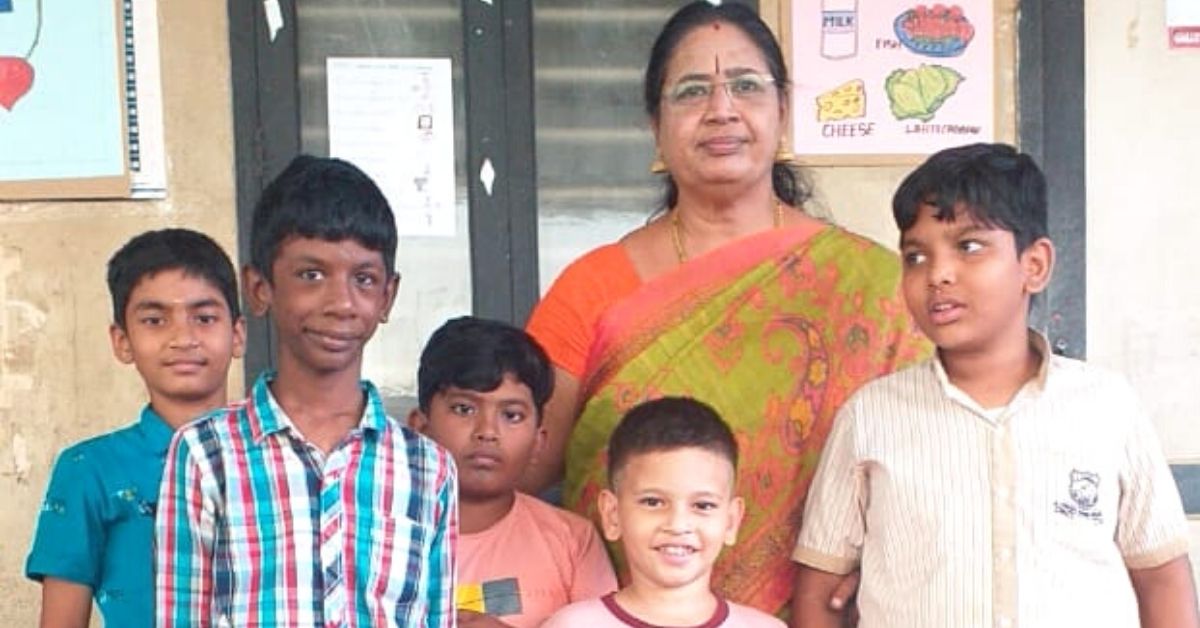We all remember that one teacher from school who taught a subject so well that they helped us master it.
Dr Bhuvana Vasudevan from Puducherry has a similar special place among some of her students. She came to the rescue of slow learners and students with developmental disorders to help them succeed when other teachers and even their parents gave up on their fate.
Today, thousands of her students owe their careers to her. Her dedication and extra effort helped them become who they are.
A Safe Space To Learn
Dr Bhuvana, a special educator and therapist, taught students at the Kendriya Vidyalaya in 1993. “Apart from being a teacher at the school, I used to take private tuitions for children at home. During such classes, I observed that some students did not absorb the subject as well as others or lacked understanding of specific topics. At times they nodded their head but they did not grasp or process the subject matter, and this was evident from their reading, writing and learning abilities,” she tells The Better India.

“Their vocabulary, verbal skills, writing and memory skills needed improvement,” says the 56-year-old, adding that she always wondered why some of her students struggled to understand a subject while others did not.
“I decided to identify the non-performers and did a bit more research on them,” she says, adding, “At the time, there was no internet or YouTube for me to quickly access and understand the student’s issues. I could only rely on books and observing the subjects.”
So she created case studies of each student. “I prepared files for about 15 children studying in Class 7 and registered data on where they lacked in performance.” It was here that she realised that the conventional methodology for these students would not work, and she would have to make changes to her teaching methodology.
“The students needed additional efforts and a different approach to make them understand the subjects. I took cues from psychology and created flash and colouring cards to add a twist to my teachings. I showed them words individually, taught them spelling through phonetics and used Sanskrit verses from the Tamil language to improve their pronunciation,” she explains.
She then assessed students based on their improvement in comprehension skills and memory, their ability to complete an activity and so on. “I also conducted exercises for examining the attitude and aptitude of each student and made notes based on such parameters. I included activities and games to ensure that my teachings were joyful and fun. At times I would make boards of alphabets and asked students to find the word around a room,” she says.
An additional couple of hour-long sessions conducted by Dr Bhuvana to implement unique methods bore fruits within months as students started performing better. “The students’ potential needed to get unblocked, and friendly behaviour along with rapport building helped to achieve the same. The students could confide in me and they were confident that I possessed the abilities to teach the topics that no one else could,” she says.
Additionally, the parents were impressed by the improvements in their pupils and suggested Dr Bhuvana start a school for children with learning disabilities.
“The parents of these children were perpetually stressed about their child’s future. Some of them gave up on their children, saying they felt uncertain about their child’s career. They always received complaints from teachers regarding their child’s performance. So, I felt it was the need of the hour to give these children a helping hand,” she says.
In 1998, Dr Bhuvana opened Bridges Learning Vidyalaya at Thanthai Periyar Nagar to teach students with dyslexia, ADHD (attention deficit hyperactivity disorder), autism and other developmental disorders.
“The school also accepts students who have behavioural concerns, undergone childhood trauma and slow learners. The police department also refers a few students who are under their observation,” she says.
The school teaches students from Classes 1 to 12 and follows the Puducherry Board syllabus. Every child’s IQ is tested using Malin’s Intelligence Scale and classified into mild, moderate and severe categories, depending on their abilities.
The school adopts unique teaching methods to impart education and helps them understand topics from a child’s perspective. “I design the methodology by putting myself in the shoes of the students. I try to understand the difficulty they must be facing while learning a topic and outline a simpler method to teach accordingly,” she says.
The school has also trained teachers to teach the subjects in a friendly manner.
Over the past 25 years, the school has educated over 6,000 students, many of whom are now doctors, managers and engineers working in reputed companies. Some others are in the hospitality industry, social work and nutrition.
Uthamanathan, father of Suryanarayan, a student at the school, says, “My child was reluctant to go to a conventional school. He cried and even hid in various parts of the house. His grades were low, and he failed to score beyond single-digit marks. We received frequent complaints from his school.”
Uthamanathan then learned that his child was 20 per cent dyslexic and a slow learner. He says, “I learned about Dr Bhuvana’s school and admitted Suryanarayan in Class 4. He completed his schooling and is now pursuing his MBA in logistics from reputed Hindustan University.”
He adds that Dr Bhuvana chalked out a customised curriculum and teaching method for his child, which helped him develop an interest in studies and perform better.
He gives credit for his child’s success to Dr Bhuvana. “I was worried about my son’s future. And it is only through the relentless efforts put in by Dr Bhuvana that my child has been able to enter mainstream education. His chances of getting a job through a campus placement look promising,” Uthamanathan says.
Job Satisfaction Like No Other
Dr Bhuvana says many parents like Uthamanathan feel helpless about giving special attention to their child’s needs. “The parents always feel they need someone like me for their child, and I feel glad that I can help them,” she adds.
But despite Bridges Learning Vidyalaya being a service-based organisation, it faces financial crunches. “Currently, about 500 students are learning at the school. But we operate from fees of barely 30 per cent of the parents. About 100 are orphans and have been adopted by the school. Many of the students’ parents belong to the lower economic strata and cannot afford fees. We also approach students from a rural background in Puducherry,” she says.
Besides, Dr Bhuvana needs funds to set up a national institute to offer vocational courses. “We also plan to start a catering college and train the younger generation to identify children with developmental disorders and train them to educate others,” she says.
Though demanding, Dr Bhuvana says her job gives her satisfaction. “On many occasions, the pressures at various levels make me feel dispirited and burdened. But when a child learns well and hugs me in return, it gives me satisfaction. I draw energy from children’s love and my passion for teaching,” she says.
To enquire about the school, call 9894507259.
Edited by Yoshita Rao
If you found our stories insightful, informative, or even just enjoyable, we invite you to consider making a voluntary payment to support the work we do at The Better India. Your contribution helps us continue producing quality content that educates, inspires, and drives positive change.
Choose one of the payment options below for your contribution-
By paying for the stories you value, you directly contribute to sustaining our efforts focused on making a difference in the world. Together, let's ensure that impactful stories continue to be told and shared, enriching lives and communities alike.
Thank you for your support. Here are some frequently asked questions you might find helpful to know why you are contributing?

